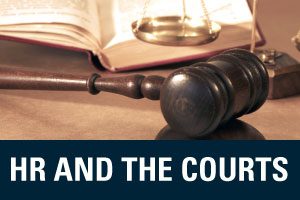HR and the Courts — December 2023
Each month, CUPA-HR General Counsel Ira Shepard provides an overview of several labor and employment law cases and regulatory actions with implications for the higher ed workplace. Here’s the latest from Ira.
University of California May Test Federal Ban on Hiring Undocumented Workers
The University of California may be the first public institution to challenge whether the 1986 Immigration Reform and Control Act (IRCA) applies to state entities, including public colleges and universities. The IRCA prohibits U. S. employers from hiring undocumented workers.
On November 20, 2023, the University of California postponed plans to go forward with a self-imposed deadline of November 30, 2023, to initiate a plan to hire undocumented workers. The university has decided to study the issue further before deciding on a specific course of action. The Supreme Court has dealt with the constitutionality of federal regulation of state employers on multiple occasions in the past, having come down on both sides of the issue. We will follow developments in this area as they unfold.
Texas Community College Wins Suit Brought by Professor Who Commented on Race and COVID-19 Policies
Collin College in Texas prevailed in partial summary judgement against a former professor who sued alleging First Amendment free speech retaliation in the non-renewal of his teaching contract. He claimed his contract was terminated because of his outspoken views as a private citizen on public issues including race relations in Dallas, Confederate monuments and his criticism of the college’s COVID-19 policies.
The court granted part of the college’s motion to dismiss because the college’s policies were not facially unconstitutional. However, the federal court denied each side’s motions for summary judgement on the professor’s claims that the college’s policies were overboard in their restriction of his speech, holding that the issue should be reserved for decision until factual questions are resolved (Phillips v. Collin Community College District (E.D. Tex. No. 22-cv-00184, 11/4/23)).
Law Professor Sues Northwestern University, Claiming Age Discrimination
A 78-year-old law professor has sued his university employer claiming age-based salary discrimination. The professor, who is tenured and taught at the law school for 42 years, claims he has been consistently paid substantially less than “significantly younger, less experienced and less tenured” comparators (Postlewaite v. Northwestern University (N.D. Ill. No 1:23-cv-15729, Comp filed 11/7/23)).
The professor claims to be “a preeminent scholar” in the field of tax law and started his law school’s lucrative Master of Laws in Taxation program, which he claims has been the school’s “highest ranked specialty department” for 17 of the last 19 years. The professor alleges that he has been awarded lower base-salary increases than his younger counterparts. He further alleges that for the academic year 2022-23, his salary was $7,000 less than the 50th percentile and $55,000 less than the 75th percentile, even though those percentiles equated to 20 and 32 years, respectively, of total teaching while he has completed 49 years of total legal academic teaching.
The lawsuit was filed in federal court and alleges violation of the federal Age Discrimination in Employment Act and the Illinois Human Rights Act.
Supreme Court Declines to Review Decision on UPS Driver’s Disability Accommodation
The Supreme Court declined to review a 4th U.S. Circuit Court of Appeals case in which the 4th Circuit upheld the dismissal of a driver’s disability accommodation request. The driver requested that he be allowed to drive a smaller truck with softer suspension to accommodate his hip and back bursitis disability, which caused him severe pain (Hannah v. United Parcel Service (Case No. 23-264 US Sup Ct, cert den. 11/6/23)).
The 4th Circuit decision, which the Supreme Court let stand, concluded that the employee’s request for an accommodation was not reasonable because the request altered the “essential elements” of the employee’s job. The court concluded that if the driver was given the accommodation to drive a smaller truck, he would not be able to complete the daily work load requirement of his existing driver position.
Tesla Allowed to Ban Union Shirts
The 5th U.S. Circuit Court of Appeals overturned an NLRB decision holding that Tesla violated the NLRA when it required its production employees to wear black Tesla-monogrammed uniform work shirts and did not allow production workers to wear black union-insignia work shirts. The decision of the three-judge panel was unanimous in overturning the NLRB ruling against Tesla (Tesla v. NLRB (5th Cir. No. 22-60493 11/14/23)).
While Tesla had banned the wearing of union-insignia work shirts, it allowed production employees to wear Tesla-insignia work shirts with a union insignia pinned on the shirt. Tesla had argued unsuccessfully to the NLRB that its rule was necessary to prevent damage to cars and to help supervisors distinguish between production employees and other employees at the company’s California facility. The Court of Appeals decision allows Tesla to continue to enforce its prior policy requiring Tesla-insignia work shirts, with the employee’s option of pinning on a union insignia.
Appeals Court Affirms Dismissal of Gymnastic Coach’s Wrongful Termination and Defamation Lawsuits
A Pennsylvania state appellate court affirmed a trial court dismissal of a former Pennsylvania State University gymnastic coach’s lawsuit. The former coach alleged defamation and violation of his employment contract when the university terminated his contract after investigating allegations that he created a hostile environment for gymnasts. The three-judge appellate panel adopted the decision of the trial court judge, concluding that the university had good cause for firing the coach and that the athletic director’s statement about prior accusations against him had not been defamatory (Thompson v. Pennsylvania State University (Case no. 1460 MDA 2022, 11/28/23)).
The appeals court ruled that the gymnastic coach’s high profile in collegiate sports made him a limited public figure and that the university’s reaction to allegations of mistreatment of athletes were matters of public concern. That meant that the plaintiff must show “actual malice” in order to prove defamation in these circumstances. The appellate court concluded that the university’s actions did not rise to the level of “actual malice.”



